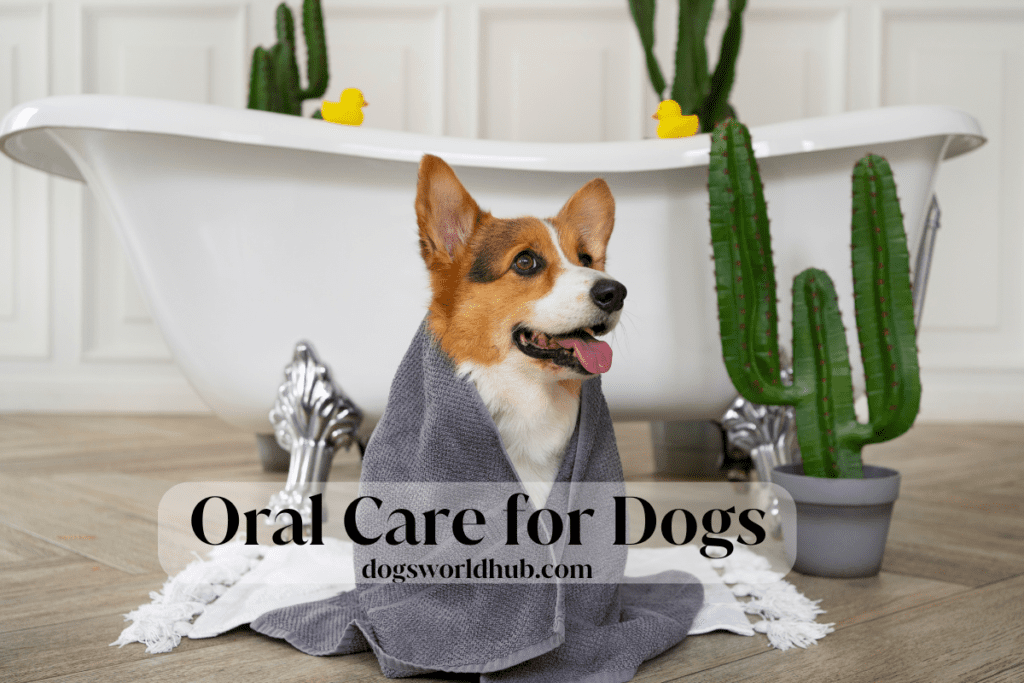Just like people, dogs need regular oral care to keep their teeth and gums healthy. If you don’t take care of your dog’s mouth, they can get problems like gum disease, tooth loss, and even infections that can affect their heart, liver, and kidneys. This article will explain why dog dental care is important, common dental problems dogs face, and easy ways to keep your dog’s teeth clean.
Why Dog Dental Care is Important
Taking care of your dog’s teeth is very important for their overall health. If you don’t clean their teeth, plaque and tartar can build up, causing gum disease and other health issues. Regular dental care helps prevent these problems and keeps your dog happy and healthy.
Preventing Dental Disease
Dental disease is very common in dogs. It starts with plaque, a sticky film of bacteria on the teeth.If plaque isn’t cleaned off, it hardens into tartar, which can make gums swell and eventually cause gum disease. Signs of dental disease include bad breath, red or swollen gums, trouble eating, and loose teeth.
Avoiding Bigger Health Problems
If your dog’s dental health is bad, bacteria from their mouth can enter their bloodstream and cause serious health problems like heart disease, liver disease, and kidney disease. Keeping your dog’s teeth clean helps prevent these dangerous conditions.
Common Dental Problems in Dogs
There are several dental issues that can affect dogs. Knowing what to look for can help you catch problems early and get them treated.
Gum Disease
Gum disease affects the gums and the structures that support the teeth.It starts with gingivitis (gum inflammation) and can get worse, leading to serious infections, bone loss, and even tooth loss if not treated. Signs include bad breath, red or swollen gums, difficulty eating, and loose teeth.
Broken Teeth
Dogs can break their teeth by chewing on hard objects like bones or hard toys. A broken tooth can hurt and might cause an infection. If your dog is favoring one side of their mouth, dropping food, or avoiding certain chew toys, they might have a broken tooth.
Retained Baby Teeth
Puppies usually lose their baby teeth by six months old. Sometimes, baby teeth don’t fall out, which can lead to crowded and crooked teeth. These retained teeth should be removed by a vet to prevent future dental issues.
Mouth Tumours
Dogs can get tumours in their mouths. Signs include swelling, bleeding, trouble eating, and bad breath. Early detection and treatment are important for a better outcome.
Ways to Keep Your Dog’s Teeth Clean
Keeping your dog’s mouth healthy involves regular care at home and visits to the vet. Here are some simple steps to ensure your dog’s teeth and gums stay healthy.
Brush Their Teeth Regularly
Brushing your dog’s teeth is the best way to remove plaque and prevent tartar. Use a toothbrush and toothpaste made for dogs, as human toothpaste can be harmful. Aim to brush your dog’s teeth at least two to three times a week, but daily brushing is best.
Use Dental Chews and Toys
Dental chews and toys can help keep your dog’s teeth clean. Look for products approved by the Veterinary Oral Health Council (VOHC), as these are proven to work. Chewing on these items also satisfies your dog’s natural urge to chew and promotes dental health.
Get Professional Cleanings
Regular professional cleanings by a vet are crucial for your dog’s oral health. During these cleanings, the vet removes plaque and tartar, polishes the teeth, and checks for any dental problems. Most dogs need professional cleanings once a year, but some may need them more often.
Try Dental Diets and Water Additives
Special dental diets and water additives can help maintain your dog’s oral health. Dental diets reduce plaque and tartar, and water additives contain enzymes or antibacterial agents to control bacteria. Ask your vet for recommendations.
Schedule Regular Dental Checkups
Regular dental checkups with your vet are important for early detection of dental problems. During these checkups, the vet examines your dog’s mouth, teeth, and gums for signs of disease. Early detection helps prevent serious complications.
Recognizing Dental Problems in Dogs
Spotting dental issues early is key to effective treatment. Watch for signs of dental problems in your dog, such as:
- Bad Breath: Persistent bad breath can indicate dental disease or infection.
- Drooling: Excessive drooling, especially if it’s bloody, may signal oral problems.
- Difficulty Eating: Reluctance to eat, dropping food, or chewing on one side can indicate dental pain.
- Swollen or Bleeding Gums: Red, swollen, or bleeding gums are signs of gum disease.
- Loose or Missing Teeth: Loose or missing teeth can result from advanced gum disease or injury.
- Behavioural Changes: Changes in behaviour, like irritability or withdrawal, can be due to dental pain.
If you see any of these signs, take your dog to the vet as soon as you can.
FAQ’s
Q: Why is dental care important for dogs?
Dental care is important for dogs because it prevents plaque and tartar buildup, which can lead to gum disease, tooth loss, and serious infections affecting the heart, liver, and kidneys.
Q: How often do I need to brush my dog’s teeth?
Ideally, you should brush your dog’s teeth daily. However, brushing at least two to three times a week can still significantly help in removing plaque and preventing tartar buildup.
Q: What type of toothbrush and toothpaste should I use for my dog?
Use a toothbrush and toothpaste that are made just for dogs. Human toothpaste can be harmful to dogs, so it’s important to use products made for canine use.
Conclusion
Taking oral care of dogs is essential for their overall health and happiness. Regular brushing, dental chews, professional cleanings, and checkups help prevent dental disease and ensure your dog’s mouth stays healthy. By focusing on your dog’s dental hygiene, you contribute to their long-term well-being.

